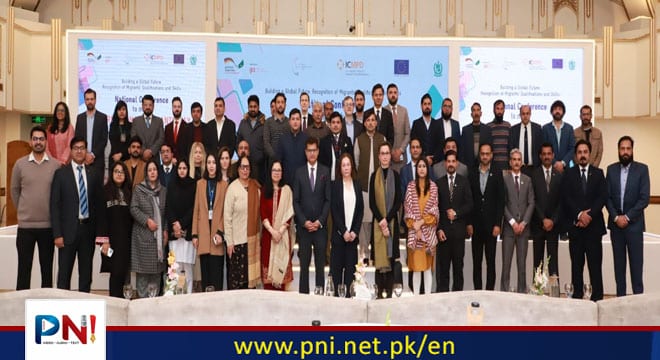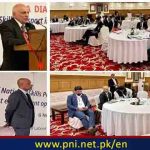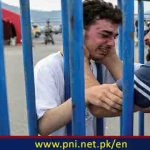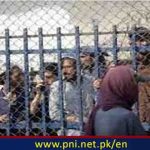Islamabad, Tuesday, 19 December 2023
International Migrants Day, observed annually on 18th December, serves as a global platform to recognise, and celebrate the contributions of migrants to societies worldwide. International Migrants’ Day promotes the opportunity to reflect on the positive impacts of migration, raise awareness on the challenges they face and encourages dialogue on the importance of safe and orderly migration with full respect for the dignity and human rights of migrants.
This year’s theme, “Building a Global Future: Recognition of Migrants’ Qualifications and Skills” has been selected by ICMPD and GIZ, considering the shared goals and priorities of the Government of Pakistan. The discussion focused on the promoting the export of skilled labour, meeting the skilled labour needs of destination countries, and addressing migrants’ aspirations for skill recognition. The event explored challenges migrants face in global skill recognition and proposed viable solutions.
The event brought together a diverse range of over 60 stakeholders, including Government officials, policymakers, academia, diplomats, international organisations, and civil society representatives. This collaborative effort sparked dialogues leading to ensuring equitable recognition of migrants’ qualifications and skills across various sectors.
Ms. Raana Rahim, Head of Office/ Country Coordinator ICMPD, Pakistan in her opening remarks stated the importance of skills partnerships can contribute to effective tapping of the potential of migrants. Such partnerships can be an innovative mechanism for maximising brain gain, or the knowledge and skills of migrants, both in origin and destination countries. Speaking about the day, she emphasised the importance of protecting and promoting the rights of migrants as it serves as a reminder to uphold the principles of equality, non-discrimination, and the right to a dignified life for all individuals, regardless of their migration status.
Ms. Romina Kochius, Coordinator Sustainable Economic Development, Training and Development, GIZ, emphasised the critical role of sustainable economic development in supporting migrant communities during her welcome remarks on the International Migrants Day event. She highlighted the necessity of comprehensive training programs to empower migrants with essential skills for integration. Furthermore, Ms. Kochius underscored GIZ’s commitment to fostering talent partnerships, recognising the diverse skills migrants bring, and collaborating with stakeholders to create an inclusive environment. This integrated approach aims to not only address the challenges faced by migrants but also contribute to their successful socio-economic integration.
Mr. Aurangzeb, Joint Secretary Ministry of Overseas Pakistanis and Human Resource Development highlighted the presence of all relevant authorities and stakeholders at the event as a testament of their commitment towards promoting safe and dignified migration from Pakistan. Highlighting the importance of migrants’ contributions to the societies, he stated that Migrants are not mere statistics; they are architects of change. It is essential to acknowledge and appreciate the wealth of experience, knowledge, and skills that migrants bring to both their host and home countries. The path forward involves the establishment and adoption of international standards for recognising qualifications and skills. Bilateral and multilateral cooperation is not an option but a necessity, ensuring a fair and transparent system that benefits both migrants and host communities.
He further added that the recognition of qualifications is not solely a bureaucratic process; it is about fostering social integration and inclusion. At the same time, national policies play a pivotal role in shaping the landscape for migrants and the Ministry is reviewing and aligning its policies, developing programmes to facilitate the recognition of migrants’ qualifications and skills in order to create an environment that is fair, transparent, and conducive to the seamless integration of migrants into the workforce.
Mr. Naseer Khan Kashani, Managing Director of Overseas Employment Cooperation, focused on the imperative shift from low-skilled to semi and highly skilled migration, Mr. Kashani underscored the evolving landscape of global migration. Emphasizing the need for a paradigm shift in recognising the skills and qualifications of migrants, he highlighted the significant role that semi and highly skilled individuals play in contributing to destination countries. Mr. Kashani’s insights shed light on the importance of harnessing the potential of skilled migrants to promote economic growth and foster a more inclusive and equitable approach to international labour markets.
In another session on “Skills for Tomorrow,” Mr. Abdul Hafeez Abbassi, Director General (SS&C), National Vocational and Technical Training Commission highlighted the importance of anticipating future labour market trends and advocated for fair recognition of migrant qualifications. His insights underscored the need for proactive measures to equip migrants with the skills essential for success in evolving job markets.
Ms. Michaelle Nintcheu, Researcher from the Institute of German Economy delivered a comprehensive presentation on the key features of Germany’s Skilled Immigration Act underscoring the significance of policies that promote skilled immigration, fostering economic growth and global collaboration. In her address, Ms. Nintcheu explained different aspects of the legislation. The presentation provided a comprehensive understanding of the measures aimed at attracting and integrating skilled professionals into Germany.
In his concluding remarks, Dr. Mansoor Zaib Khan, National Team Leader/DV, Programme Centres for Migration and Development (ZME), Head of Programme/AV, TVET Sector Support Programme (TVET SSP) encapsulated the essence of today’s discussions on recognition of migrants’ qualifications and skills. He emphasised the significance of talent partnerships and highlighted the collective responsibility to promote regular migration and contributes to dignified migration. The event served as a catalyst for recognising migrants’ contributions and expressed optimism for the positive impact it will have on promoting skilled migration From Pakistan.
This event served as a platform for meaningful dialogue, bringing together stakeholders committed to shaping a more inclusive and supportive environment for migrants, recognizing the diverse skills and experiences that migrants bring, paving the way for a more equitable and prosperous future for all.








